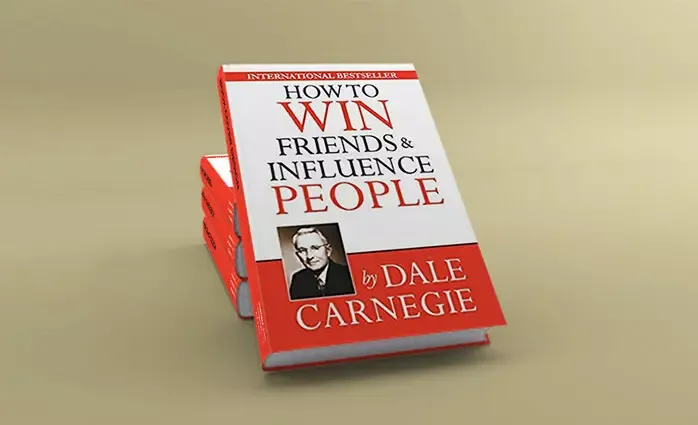How to Win Friends and Influence People
Notes on Dale Carnegie's How to Win Friends and Influence People. This post is part of a series where I review what I learned from each book I read.

"I did it! Yes, I did it! I convinced the Food Services people to pilot LunchTrak over the summer. I think the How to Win Friends and Influence People book helped since I listened more and let them think that some ideas were their own (even when I was already thinking it), like splitting two lines for 'express lane' or piloting the program over the summer where there are fewer people"
-- My notebook (3/22/23)
How to Win Friends and Influence People completely changed how I deal with other people. Combining some ideas from this book and the 7 Habits of Highly Effective People, my new approach to solving disputes and asking for favors was wildly more successful. For instance, I had a lot of success in my meetings for the LunchTrak project, which we are going to pilot over summer school. I never wrote any notes in my notebook, so I will summarize whatever I can remember here.
"A person's name is to him or her the sweetest and most important sound in any language"
Make it a priority never to forget someone's name (especially if you think you'll ask them for a favor in the future). I remember some kid in my Analysis class was like, "What's your name again?", and it was really annoying. The point is, DO NOT forget people's names.
Remembering peoples' names makes them feel important, which is what all of us want at the end of the day (at least according to Dale Carnegie). Use this knowledge to your advantage and build better relationships with other people.
How to Get What You Want
Stop criticizing, arguing, or complaining; it's really annoying. Instead, you should be open to the other person's ideas and be genuinely interested in what they have to say. Related to this idea (but from The 7 Habits of Highly Successful People) is that you should always listen and understand the problem before you respond (Habit 5: Seek First to Understand, Then to Be Understood). If you want people to listen to you, you need to them to feel like you're listening to them first.
People are generally interested in what they want. If you want something, you have to show them how it will help them get what they want. For example, if I wanted the school to pilot my LunchTrak program, I would emphasize how it would make their lives easier because they don't have to futz around with barcode scanners and keypads. A quote from the book: "Arouse in the other person an eager want. He who can do this has the whole world with him. He who cannot walks a lonely way."
Get People to Like You
If you want people to be interested in you, be genuinely interested in the other person. Listen to how they are feeling and build a good relationship with them, instead of focusing on what you want. You also want to make the other person feel important, but you don't want to be insincere (this can be seen from a mile away). One way to do this is to "be hearty in your approbation and lavish in your praise" (quoted like a million times in the book). Overall, just be a genuine person and people will like you.
Other Tips For Getting People to Agree With You
Be respectful to the other person. Never say "you're stupid" or "you're wrong". What's the point of insulting someone who you want to agree with you? If you are wrong on anything, be quick to admit it and be empathetic (apologize). Try starting out as friendly as possible to build trust, and try truly seeing things from the other person's point of view. If you can't get someone to agree with your reasoning, try appealing to a nobler motive. An example from the book is when a famous person wanted to get his kid's pictures removed from a news article, he told the reporter that their mother is worried about their safety. It's hard to argue with a mother's desire to keep her kids safe.
How to Be a Leader
Before you point out other people's mistakes, start with your own mistakes first. This will come out as less offensive and could prevent negative feelings. Speaking of mistakes, try to call them out indirectly when possible. For instance, you could ask someone how the company can ensure the server doesn't crash in the future instead of blaming them for crashing the server.
Another strategy to get people to listen is to give them a reputation to live up to. This idea is related to how people want to feel important; if you tell the company that John is the best web developer you've ever met, he'll be motivated to show that he is the best. Similarly, you want people to be happy and excited doing the things that you want. It is really hard to motivate someone to do something they hate, so try spinning the task in a way that seems fun.
Final Remarks (6/4/23)
I listened to this book in the car on the way to school every day for a couple of weeks, and I am glad I did so. Working well with other people and building relationships is one of the most important aspects of anyone's career regardless of what they want to do. Especially for me–since I want to learn about entrepreneurship–learning to work with people is a must. I hope to put these ideas into practice in the future.
